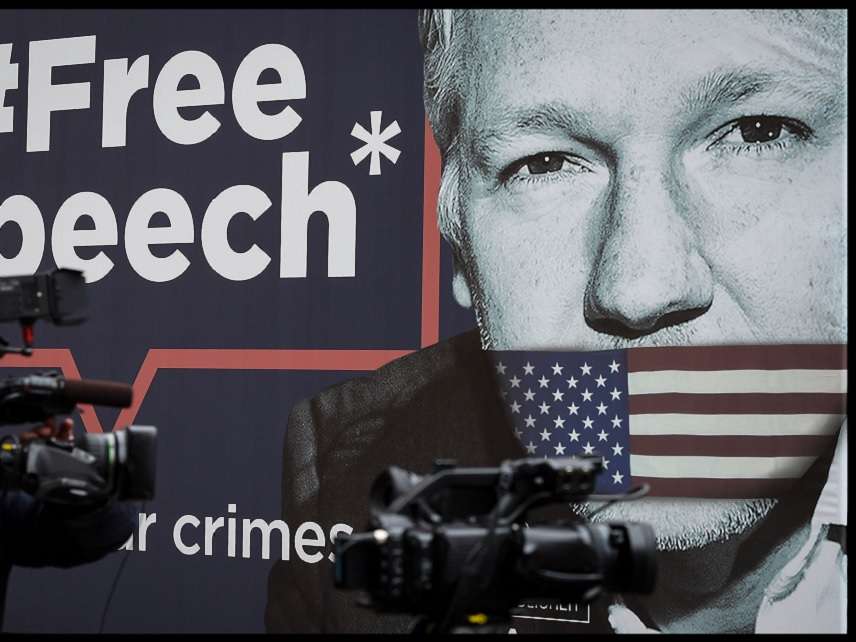Julian Assange and WikiLeaks Deserve Our Thanks for Making Governments More Transparent
The world is a better place now that it's harder than ever for governments to keep secrets.

A lot of people are dunking on WikiLeaks founder Julian Assange now that he's been arrested by British law enforcement and will likely face extradition hearings to the United States on charges that he conspired with Chelsea Manning to "commit computer intrusion" on a U.S. government machine. Assuming the British authorities do go forward with extradition, it will almost certainly be years before the matter is settled (and there's a strong argument that Assange might walk in British courts). In the meantime, Assange has effectively traded exile in Ecuador's embassy in London for a jail cell in the same city. As Robby Soave notes, prosecuting Assange for publishing leaked documents—something that media outlets do on a regular basis—would be very bad for press freedom.
Regardless of how you feel about Assange as a person, there's no question that WikiLeaks, founded in 2006, has been central to starting a salutary era of forced transparency, a time when state and corporate actors have much more trouble keeping secrets. Forced transparency is bigger than WikiLeaks, of course. It's one of the defining dynamics of our time, riding the same technological wave that gave us Napster and other innovations that disperse power and information in all sorts of unauthorized ways. But let's give credit and praise where it's due. The world is better for the fact that it's harder than ever for governments to keep their own secrets.
Early exposés by the organization included documents from the Church of Scientology and East Anglia University's Climate Research Unit. In 2010, the organization came into its own by publishing a trove of documents given to it by Chelsea Manning, then an Army intelligence analyst. Among the things that came to light:
- graphic video of a U.S. Apache helicopter killing Iraqi civilians and two Reuters journalists;
- 90,000-plus pages of military memos, now known as the Afghan War Diaries, that showed that the Taliban and the Pakistani government were in regular contact and that civilian casualties were far greater than the U.S. officially acknowledged;
- 400,000 pages of documents about the war in Iraq, including revelation of 15,000 unreported civilian deaths and brutal reprisals by Iraqi forces;
- diplomatic cables that showed a wide gulf between the U.S.'s public positions and private analysis.
In 2016, of course, WikiLeaks also released hacked emails from John Podesta, Hillary Clinton's campaign chairman, which unmasked various bad-faith dealings within the Democratic Party establishment.
There are legitimate questions about WikiLeaks' relationship with the Russian government, but it's the worst sort of whataboutism to argue that WikiLeaks' revelatons about the United States government should not be taken seriously until it releases equally damaging material about, say, the Putin regime. The information it has shared about the United States is widely understood to be accurate; calls for some sort of geopolitical balance doesn't make the group's revelations about our leaders any less true.
In 2017, FBI Director James Comey said that WikiLeaks trafficked in "public intelligence porn." Mike Pompeo, then CIA director and now secretary of state, went so far as to condemn Assange and WikiLeaks as enemies of the state. "We can no longer allow [Julian] Assange and his colleagues the latitude to use free speech values against us," Pompeo declared at the Center for Strategic and International Studies. "To give them the space to crush us with misappropriated secrets is a perversion of what our great Constitution stands for." Such talk was reminiscent of The Wall Street Journal calling Assange an "enemy of the U.S." who should face the death penalty.
Such backward thinking is absurd. We won't be "crushed" if our actions are defensible. Assume the worst about Assange, who was first taken into custody in relation to sexual assault charges in Sweden that have since been dropped. We don't need to praise the man to recognize that governments' radical loss of control of secret knowledge is ultimately a very good thing—and one that isn't going away anytime soon.
From 2010, here's a Reason video in which four experts grapple with the question, "Is WikiLeaks a Force for Good?"


Show Comments (145)